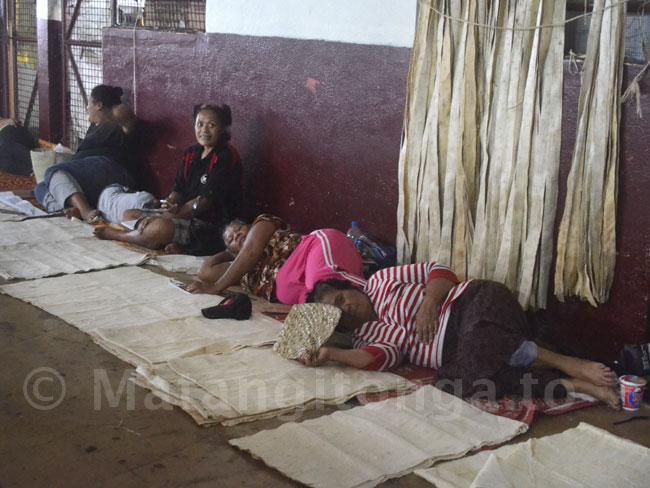
By Mary Lyn Fonua
In spite of the rain that was driving away their customers, the women vendors at Nuku‘alofa’s central Talamahu Market looked cheerful on International Women’s Day, Saturday March 8, 2014.
They always have smiling faces. From the flower-sellers sheltering under umbrellas on the wet pavement showing off their brilliant birds of paradise, huni and orchids, and from the vegetable stalls overflowing around the doorways, to the tiny packed stalls selling everything you could need on a Saturday morning - it’s clear that women’s enterprises are predominant in this overcrowded marketplace.
But here in the heart of the capital, only a stone’s throw away from the new cruise ship berth at Vuna Wharf, the Talamahu Market is a place where women’s real status in Tonga is on display for all to see.
On the floor, in the darkest corridor, at the back of the market, you will find Tonga’s traditional manufactures. The “tutu” women make their place here. There are many of them, all waiting for customers to bend down and examine the soft whiteness of their bark cloth strips - hand-beaten in a laborious process called "tutu". These producers have no stalls and sit cross-legged, with their strips of feta‘aki cloth laid out before them. Some have fallen asleep, their children beside them on the dank concrete floor, while waiting to earn a few dollars from their hard work. Rubbish on the floor of the bustling market is kicked around them by a careless public.

At Talamahu one of the tutu vendors, Folola Kolo from the Tongatapu village of Longoteme says she spends one day a week doing tutu and another one or two days at the market selling her pieces for $15 or $25 pa'anga each, depending on the size. Folola, like her adjacent seller, Sesalina Vaiangina from Makaunga, and the other women on the floor, are immensely proud of the quality of their work and their heritage.

Ngatu is still manufactured in Tonga in large amounts. The beat of the tutu wakens villages, as groups of women spend many hours a week pounding the bark of the hiapo or paper mulberry into paper-thin white sheets called feta‘aki. Other women who are too busy to do the tutu, buy the small sheets for the manufacture of the huge decorated ngatu that are used on ceremonial and important family occasions. Large ngatu are iconic symbols of the nation found in prestigious offices and venues all over the world, and in stylish homes.
Importance of women
Ngatu is also used as a foundation material in many art forms found in Tonga. A young contemporary artist Ruha Fifita shared her tapa-based work “Matala” with the International Women’s Day website. She said she was inspired by ancient Tongan designs, “in a reflection on the beauty, strength and life within a society that respects culture and tradition as the strongest foundation for sustainable change.” Tongan tapa cloth, she said, “is extremely valuable in Tongan culture and is a symbol of the importance of women.”

Image above, courtesy Ruha Fifita internationalwomensday (left) and Tangata Pasifika (right).
Ngatu-making goes way back before Tonga’s first written history and it is, probably, the oldest manufacturing industry in Tonga.
Now, that is something to be hugely proud of.
Ngatu-making is an economic achievement in manufacturing sustainability - a traditional industry that has been led by women for centuries.
Of course, the process of ngatu-making is often shown off to tourists in carefully arranged displays.
But today, in the real marketplace of this fascinating living culture, how these ngatu-makers came to be positioned here, in a squalid corridor of the Talamahu Market, is a different story. It’s a story of attitudes, of how women perceive themselves and accept “their place”, of how their own society treats them, and of how a community turns a blind eye to these appalling marketing conditions that could be so much better.
If International Women’s Day 2014 is about “Inspiring change” then it is definitely time to uplift Tonga’s traditionally productive citizens and to show off their wonderful skills and products to the marketplace in a better light. We have a long way to go before we can convince the children sleeping beside their mothers on the floor of the Talamahu Market that there is a hope for a brighter future.
International Women's Day celebrates the social, political and economic achievements of women while focusing world attention on areas requiring further action. Celebrated annually on 8 March, the 2014 themes for International Women’s Day: “Equality for women is progress for all” and “Inspiring Change”, encourage advocacy for women's advancement everywhere in every way. It calls for challenging the status quo for women's equality and vigilance inspiring positive change.







